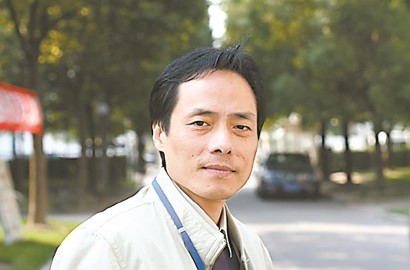China Daily Reports: Medical Researcher Endured Pain to Help Others
WANG Yiping (photo by NAN Fajun)
Co-workers of renowned scientist WANG Yiping, who died in the spring after a long battle with Crohn's disease, are hailing his dedication in helping heart disease patients across the country while battling his own illness.
In 2005, a team led by the researcher produced his first new drug, which went on to benefit 15 million coronary heart disease and angina patients in China.
WANG, who aspired to invent drugs that are the first choice for doctors around the world, was found dead on April 11 at age 55 at his office beside his lab at the Shanghai Institute of Materia Medica, Chinese Academy of Sciences.
He had kept working despite severe pain and deteriorating health from Crohn's, an inflammatory bowel disease. Found beside his body was an injectable painkiller that he used when he had an attack, which he had kept secret from most co-workers.
When he was diagnosed at age 30, WANG had a 1-meter section of his small intestine removed.
"He said he was just at the prime age for a scientist to churn out research results," said Wang's wife, FANG Jie. "He had heard the sound of the hourglass and said he aimed to produce two other new drugs within a decade. That was what he said one week before he died."
XUAN Lijiang, WANG's research partner, said WANG's ambition was to make his drug available worldwide for patients of cardiovascular diseases, one of the top global causes of death. His dream is expected to come true, XUAN said.
Development of the drug, depside salts, derived from the roots of Salvia miltiorrhiza (also known as red sage or in Chinese, danshen, a popular TCM herb) had been warmly welcomed after it hit the market in China in 2006, XUAN said. Danshen's effects include reduction of hardening of the arteries, high blood pressure and blood clot formation.
"We have plans to promote the drug overseas, and its registration in Europe has started," XUAN said. The drug is an injection based on traditional Chinese medicine (TCM) techniques.
It was authorized by China's top food and drug authorities as "a paragon of adapting TCM to modern medicine".
WANG also had been working for years to change the current formulation administered via injection into a more acceptable oral form so that patients can easily use the medication themselves at home.
DING Jian, former director general of the institute and an academician of the Chinese Academy of Engineering, said this year WANG told him that there might be a breakthrough in this respect. His team is carrying on his work.
The second-phase clinical trial of another new drug developed by WANG to fight arrhythmia, or irregular heartbeat, has been completed in China and is being carried out in the United States.
The success rate for new drug research and development is low, and researchers can end up with less-than-spectacular results after a lifetime of work, experts said.
"His life was about total dedication to developing new drugs effective and affordable for everyone," FANG said.
LI Jun, deputy Party secretary of the institute, recalled that WANG said in March that he was having pain more frequently and hormone drugs seemed no longer to work. "He said he would double the amount of hormone drugs to win more time."
JIANG Hualiang, director general of the institute, added: "President XI Jinping said doing scientific research means creating earthshaking works while keeping names concealed. WANG is worthy of that description."(Chinadaily)
Original report link: http://www.chinadaily.com.cn/a/201808/08/WS5b6ab9f2a310add14f384ae2.html?from=timeline
Contact person:
PAN Peihua (pamph@simm.ac.cn)
(Editor: PAN Peihua)





